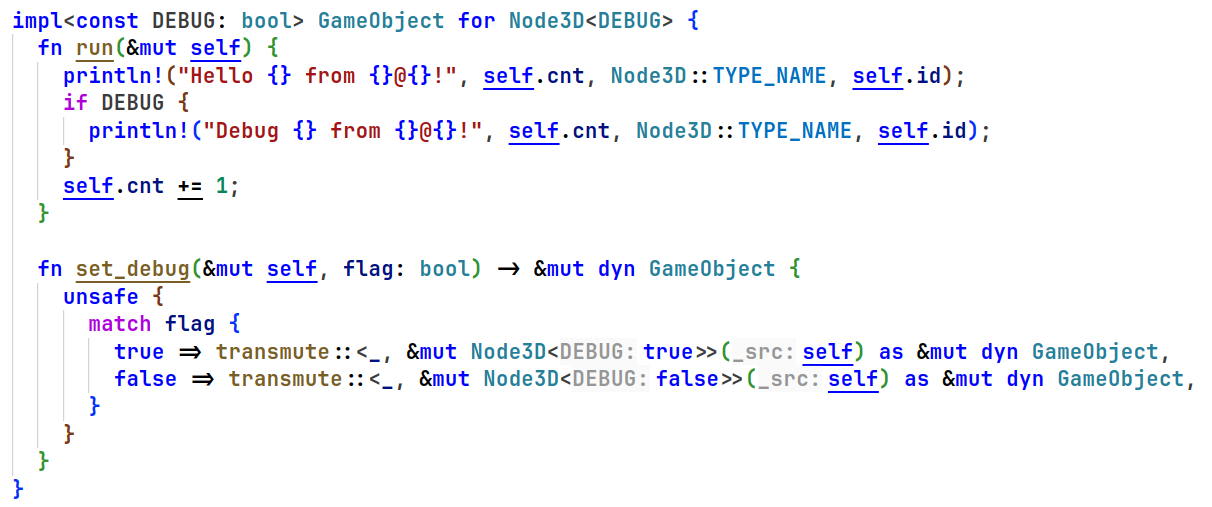Hello,
I was playing around with rust and wondered if I could use const generics for toggling debug code on and off to avoid any runtime cost while still being able to toggle the DEBUG flag during runtime.
I came up with a nifty solution that requires a single dynamic dispatch which many programs have anyways.
It works by rewriting the vtable.
It's a zero cost bool!
Is this technique worth it?
Probably not.
It's funny though.
Repo: https://github.com/raldone01/runtime_const_generics_rs/tree/v1.0.0
Full source code below:
use std::mem::transmute;
use std::sync::atomic::AtomicU32;
use std::sync::atomic::Ordering;
use replace_with::replace_with_or_abort;
trait GameObject {
fn run(&mut self);
fn set_debug(&mut self, flag: bool) -> &mut dyn GameObject;
}
trait GameObjectBoxExt {
fn set_debug(self: Box<Self>, flag: bool) -> Box<dyn GameObject>;
}
impl GameObjectBoxExt for dyn GameObject {
fn set_debug(self: Box<Self>, flag: bool) -> Box<dyn GameObject> {
unsafe {
let selv = Box::into_raw(self);
let selv = (&mut *selv).set_debug(flag);
return Box::from_raw(selv);
}
}
}
static ID_CNT: AtomicU32 = AtomicU32::new(0);
struct Node3D<const DEBUG: bool = false> {
id: u32,
cnt: u32,
}
impl Node3D {
const TYPE_NAME: &str = "Node3D";
fn new() -> Self {
let id = ID_CNT.fetch_add(1, Ordering::Relaxed);
let selv = Self { id, cnt: 0 };
return selv;
}
}
impl<const DEBUG: bool> GameObject for Node3D<DEBUG> {
fn run(&mut self) {
println!("Hello {} from {}@{}!", self.cnt, Node3D::TYPE_NAME, self.id);
if DEBUG {
println!("Debug {} from {}@{}!", self.cnt, Node3D::TYPE_NAME, self.id);
}
self.cnt += 1;
}
fn set_debug(&mut self, flag: bool) -> &mut dyn GameObject {
unsafe {
match flag {
true => transmute::<_, &mut Node3D<true>>(self) as &mut dyn GameObject,
false => transmute::<_, &mut Node3D<false>>(self) as &mut dyn GameObject,
}
}
}
}
struct Node2D<const DEBUG: bool = false> {
id: u32,
cnt: u32,
}
impl Node2D {
const TYPE_NAME: &str = "Node2D";
fn new() -> Self {
let id = ID_CNT.fetch_add(1, Ordering::Relaxed);
let selv = Self { id, cnt: 0 };
return selv;
}
}
impl<const DEBUG: bool> GameObject for Node2D<DEBUG> {
fn run(&mut self) {
println!("Hello {} from {}@{}!", self.cnt, Node2D::TYPE_NAME, self.id);
if DEBUG {
println!("Debug {} from {}@{}!", self.cnt, Node2D::TYPE_NAME, self.id);
}
self.cnt += 1;
}
fn set_debug(&mut self, flag: bool) -> &mut dyn GameObject {
unsafe {
match flag {
true => transmute::<_, &mut Node2D<true>>(self) as &mut dyn GameObject,
false => transmute::<_, &mut Node2D<false>>(self) as &mut dyn GameObject,
}
}
}
}
fn main() {
let mut objects = Vec::new();
for _ in 0..10 {
objects.push(Box::new(Node3D::new()) as Box<dyn GameObject>);
objects.push(Box::new(Node2D::new()) as Box<dyn GameObject>);
}
for o in 0..3 {
for (i, object) in objects.iter_mut().enumerate() {
let debug = (o + i) % 2 == 0;
replace_with_or_abort(object, |object| object.set_debug(debug));
object.run();
}
}
}
Note:
If anyone gets the following to work without unsafe, maybe by using the replace_with crate I would be very happy:
impl GameObjectBoxExt for dyn GameObject {
fn set_debug(self: Box<Self>, flag: bool) -> Box<dyn GameObject> {
unsafe {
let selv = Box::into_raw(self);
let selv = (&mut *selv).set_debug(flag);
return Box::from_raw(selv);
}
}
I am curious to hear your thoughts.





